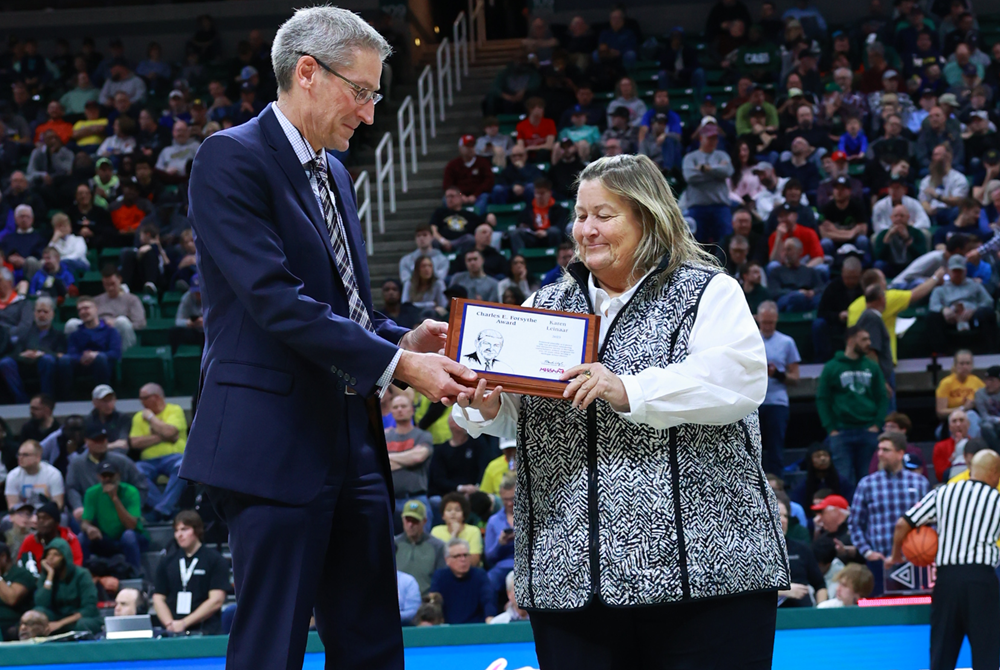
Leinaar to be Inducted into NIAAA Hall of Fame during National ADs Conference
By
Geoff Kimmerly
MHSAA.com senior editor
December 15, 2023
Frankfort’s Karen Leinaar – one of the most active and influential administrators over the century-long history of the MHSAA – will receive deserved national recognition Tuesday with her induction into the National Interscholastic Athletic Administrators Association (NIAAA) Hall of Fame during the closing banquet of the 54th National Athletic Directors Conference in Orlando.
Leinaar is in her fifth school year as executive director of the Michigan Interscholastic Athletic Administrators Association (MIAAA) – the state’s professional organization for school sports administrators – and served as an athletic administrator at five schools over four decades through this spring. She also served 22 years on the MHSAA’s Representative Council and from 2009-13 on the Board of Directors for the National Federation of State High School Associations (NFHS).
She first served as athletic director at Delton Kellogg for nearly 17 years, from March 1982 through October 1998. She spent three years at Gaylord, then 8½ at Benzie Central before taking over at Bear Lake in November 2010 and spending the next decade organizing athletic programs for students in grades 5-12 before retiring in January 2021. She returned to serve as interim AD at Frankfort for the 2022-23 school year.
Leinaar has been honored several times for her contributions, most recently with the MHSAA’s Charles E. Forsythe Award for a lifetime of contributions to school sports. She also received the MHSAA’s Women In Sports Leadership Award in 1998, a Citation from the NFHS in 2000, was named MIAAA Athletic Director of the Year in 2001 and received an MHSAA’s Allen W. Bush Award in 2014.
A multiple-sport standout while attending Delton Kellogg High School, Leinaar graduated in 1977 and then earned a bachelor’s degree in physical education, health and recreation, with a minor in driver education, from Michigan State University in 1982. She completed a master’s in athletic administration from Western Michigan University in 1994.
The NADC banquet begins at 6 p.m. Tuesday and will be streamed live on the NFHS Network at no cost. Click to watch.
PHOTOS Frankfort’s Karen Leinaar accepts the 2023 Charles E. Forsythe Award from Grand Haven superintendent and MHSAA Representative Council president Scott Grimes during the Division 1 Boys Basketball Final in March.

Thank Roosevelt for Football Weekends
December 20, 2013
By Rob Kaminski
MHSAA benchmarks editor
The next time you find yourself immersed in a tense crosstown football rivalry on a Friday night followed by a Saturday pilgrimage to the nearest college campus and a Sunday afternoon with a remote and your favorite snacks and beverages, take a moment to consider what the weekend would be like if it weren’t for Teddy Roosevelt.
The man who became our 26th President shortly after the turn of the 20th Century following the assassination of William McKinley in 1901 was a football fan like you. Maybe more so.
Today’s game of football has reached a critical crossroads. Player size and speed have increased across the board. Savage use of equipment as weapons rather than protective gear has been glorified on television networks and social media. Leaders of the game at all levels have recognized the need for change, employing new rules and widespread educational efforts to aid in preserving the sport.
History, as they say, is repeating itself.
In an ironic twist, it was Roosevelt who saved the then-brutally violent game of football from itself more than 100 years ago. Yes, the same “Rough and Ready Teddy” who led the charge up San Juan Hill during the Spanish-American War and often sparred in the boxing ring while in office from 1901-09 opined that football was becoming so gruesome that he delivered an ultimatum: clean up the game or it would be outlawed.
The Chicago Tribune reported that in 1904 alone, there were 18 football deaths and 159 serious injuries, mostly among prep school players. Football deaths suffered by younger players were reported on a nearly weekly basis, as outraged citizens called on colleges and high schools to banish football outright.
In stepped Roosevelt, who called head coaches and representatives from Harvard, Yale and Princeton – college powers at the time – to the White House in 1905 urging them to eliminate excessive violence and set an example of fair play for the rest of the country. When the casualties actually rose by one during the ensuing season, Roosevelt reacted with greater resolve and convened leading football authorities for the purpose of authoring drastic rules changes. What emerged was an intercollegiate conference which was the predecessor of the NCAA.
Among the most effective changes for the 1906 season were the legalization of the forward pass, the elimination of mass formations, and the creation of a neutral zone. Football fatalities fell to 11 in each of the next two seasons, and severe injuries fell drastically.
Thanks to the introduction of protective equipment and ever-evolving rules changes, football during the 100-plus years to follow has become an exponentially safer game. Yet, the game’s leaders always will need to adjust and react to scrutiny that comes with the territory.
So, as the game once again undergoes rules modifications in the name of safety, give a tip of the cap to President Roosevelt while you enjoy college bowl season and the NFL playoffs and begin to think ahead to the first high school practice of 2014.

